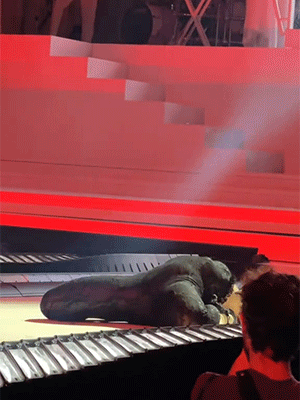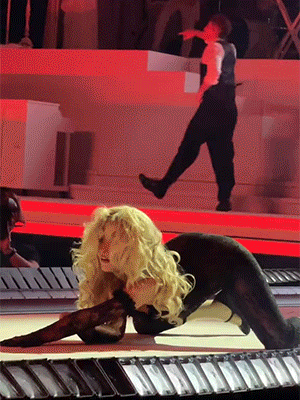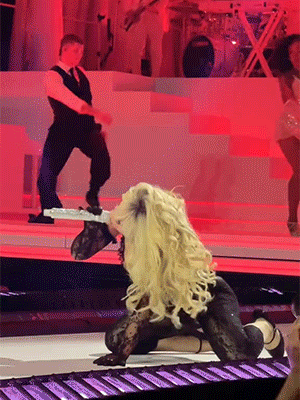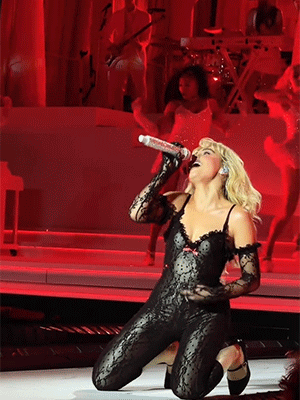I Think A Lot About What It Is To Be A Woman In Science, But I Have The Inherent Privilege That Comes
I think a lot about what it is to be a woman in science, but I have the inherent privilege that comes with being a white woman to shield me from the worst of it. I had an absolutely eye opening conversation with classmate of mine last year, and I’d like to share it with y’all.
This other lab member of mine became a great friend of mine around the time I decided to switch labs. She had a different PI and was a year ahead of me, so I was comfortable bringing my concerns to her. Her support was instrumental in my decision and my current happiness in my new lab. She presented in a lab meeting the day I went to the director of our grad school and requested a change in PIs, so I missed it. I knew she had been nervous (it was meant to prepare her for for her preliminary exam) so I asked her the next day how it had gone.
Now. To put this in context, I need to explain my old PI. He was an almost eighty year old white man, and if it wasn’t his opinion, it was wrong. He was very, very bad at being a PI. He was also probably worse at being a co-worker. I recall at least three lab meetings that devolved into him yelling with another PI, and several student presentations that he was terribly mean and unnecessarily fixated on insignificant details. So it comes as no shock that he went after my friend.
My old PI (who was not involved in bacteria research AT ALL) had taken some issue with the strain of bacteria she was using, one that was selected based on clinical relevancy. This had resulted in a dissolving of my friends presentation into him interrogating her about this strain, interrupting her explanations and generally getting louder and louder and louder until her PI stepped in. Upon hearing all of this, I apologized profusely for his behavior and asked how she was doing now. She expressed to me how she had struggled to remain calm, and how she was ultimately grateful to her PI for de-escalating the situation.
Now here’s the part that hit me hard: my friend explained to me that she was grateful mostly because she wasn’t sure how much longer she would have been able to withstand his nonsense without raising her voice, to which I responded, “he would have deserved it. You were right and he was wrong, and it’s beyond time he was put in his place. He’s not your PI, and he’s not on your committee, so I think you would have been wholly justified in standing up for yourself.”
“If I’d had raised my voice at him, even a little, I would have been labeled an angry black woman, and everyone in that room would have written me off as a stereotype of my race.”
Oh. Ohhhhh. OH that hit me in the heart and the brain and the soul and I’m shocked I didn’t get a bruise. My sweet, strong, smart friend, who was a mom and a wife and a brilliant student and a kind soul, had to weigh every word out of her mouth with a gravity I couldn’t understand, and had never considered until that moment. And it probably says a lot about my white privilege and my bubble I’ve grown up in that I was 24 years old before this came across to me. But this conversation has lived in my head ever since, and my perspective of the world shifted because of it. I think what made this particular incidence so eye opening to me was that being interrogated by this man over stupid details was something that happened to me regularly, and had just pushed me over the edge. Realizing some level of privilege had protected me all along from it being worse was enlightening.
I’ve benefitted my whole life from white privilege (a thing my family doesn’t think exists). I’m nowhere near perfect as an ally or a friend or a person, but I want to be better at standing up for and alongside those who need the protection my privilege offers. I share this now in case it resonates with someone else the way it did with me.
Black lives matter. Black people matter. Your hearts matter and your ideas matter and your feelings and your dignity and hurt and anger and fear. It shouldn’t require stating but it does, and I am so so sorry for your pain, for every situation I wouldn’t think twice in that you have to navigate carefully. I’m sorry, and I stand with you.
More Posts from Kiatomyheart and Others










scenery in suzhou and hangzhou of china by 陈帆fotochen


Well, I heard you're back together and if that's true You'll just have to taste me when he's kissin' you If you want forever, I bet you do (I bet you do) Just know you'll taste me too
SABRINA CARPENTER and JENNA ORTEGA — Sabrina Carpenter: Taste (Official Video)

LaRue Burbank, mathematician and computer, is just one of the many women who were instrumental to NASA missions.
4 Little Known Women Who Made Huge Contributions to NASA
Women have always played a significant role at NASA and its predecessor NACA, although for much of the agency’s history, they received neither the praise nor recognition that their contributions deserved. To celebrate Women’s History Month – and properly highlight some of the little-known women-led accomplishments of NASA’s early history – our archivists gathered the stories of four women whose work was critical to NASA’s success and paved the way for future generations.
LaRue Burbank: One of the Women Who Helped Land a Man on the Moon
LaRue Burbank was a trailblazing mathematician at NASA. Hired in 1954 at Langley Memorial Aeronautical Laboratory (now NASA’s Langley Research Center), she, like many other young women at NACA, the predecessor to NASA, had a bachelor's degree in mathematics. But unlike most, she also had a physics degree. For the next four years, she worked as a "human computer," conducting complex data analyses for engineers using calculators, slide rules, and other instruments. After NASA's founding, she continued this vital work for Project Mercury.
In 1962, she transferred to the newly established Manned Spacecraft Center (now NASA’s Johnson Space Center) in Houston, becoming one of the few female professionals and managers there. Her expertise in electronics engineering led her to develop critical display systems used by flight controllers in Mission Control to monitor spacecraft during missions. Her work on the Apollo missions was vital to achieving President Kennedy's goal of landing a man on the Moon.
Eilene Galloway: How NASA became… NASA

Eilene Galloway wasn't a NASA employee, but she played a huge role in its very creation. In 1957, after the Soviet Union launched Sputnik, Senator Richard Russell Jr. called on Galloway, an expert on the Atomic Energy Act, to write a report on the U.S. response to the space race. Initially, legislators aimed to essentially re-write the Atomic Energy Act to handle the U.S. space goals. However, Galloway argued that the existing military framework wouldn't suffice – a new agency was needed to oversee both military and civilian aspects of space exploration. This included not just defense, but also meteorology, communications, and international cooperation.
Her work on the National Aeronautics and Space Act ensured NASA had the power to accomplish all these goals, without limitations from the Department of Defense or restrictions on international agreements. Galloway is even to thank for the name "National Aeronautics and Space Administration", as initially NASA was to be called “National Aeronautics and Space Agency” which was deemed to not carry enough weight and status for the wide-ranging role that NASA was to fill.
Barbara Scott: The “Star Trek Nerd” Who Led Our Understanding of the Stars

A self-described "Star Trek nerd," Barbara Scott's passion for space wasn't steered toward engineering by her guidance counselor. But that didn't stop her! Fueled by her love of math and computer science, she landed at Goddard Spaceflight Center in 1977. One of the first women working on flight software, Barbara's coding skills became instrumental on missions like the International Ultraviolet Explorer (IUE) and the Thermal Canister Experiment on the Space Shuttle's STS-3. For the final decade of her impressive career, Scott managed the flight software for the iconic Hubble Space Telescope, a testament to her dedication to space exploration.
Dr. Claire Parkinson: An Early Pioneer in Climate Science Whose Work is Still Saving Lives

Dr. Claire Parkinson's love of math blossomed into a passion for climate science. Inspired by the Moon landing, and the fight for civil rights, she pursued a graduate degree in climatology. In 1978, her talents landed her at Goddard, where she continued her research on sea ice modeling. But Parkinson's impact goes beyond theory. She began analyzing satellite data, leading to a groundbreaking discovery: a decline in Arctic sea ice coverage between 1973 and 1987. This critical finding caught the attention of Senator Al Gore, highlighting the urgency of climate change.
Parkinson's leadership extended beyond research. As Project Scientist for the Aqua satellite, she championed making its data freely available. This real-time information has benefitted countless projects, from wildfire management to weather forecasting, even aiding in monitoring the COVID-19 pandemic. Parkinson's dedication to understanding sea ice patterns and the impact of climate change continues to be a valuable resource for our planet.
Make sure to follow us on Tumblr for your regular dose of space!

Hyunji Shin for Numéro Magazine (2023) Photography: Szilveszter Makó

Engineer Karen Leadlay working on the analog computers in the space division of General Dynamics, 1964.

Deniz Burnham
A former NASA intern, Deniz Burnham started her career as an engineer on an oil rig in Prudhoe Bay, Alaska, and went on to lead operations on drilling rigs in Canada, Ohio, and Texas. https://go.nasa.gov/3wDpfBo
Make sure to follow us on Tumblr for your regular dose of space!




Short N Sweet Tour / MSG



JENNA ORTEGA🩸 Taste (2024) Scream VI (2023) Wednesday (2022)


"The Kiss of the Oceans"
American vintage postcard








Shangri-la香格里拉, yunnan province and Daocheng Yading稻城亚丁, sichuan province in china
-
 calliope-ev liked this · 4 months ago
calliope-ev liked this · 4 months ago -
 kiatomyheart reblogged this · 7 months ago
kiatomyheart reblogged this · 7 months ago -
 0dua-lipa0 liked this · 11 months ago
0dua-lipa0 liked this · 11 months ago -
 ila-2000 liked this · 1 year ago
ila-2000 liked this · 1 year ago -
 questionable-gods liked this · 2 years ago
questionable-gods liked this · 2 years ago -
 rachbananas liked this · 2 years ago
rachbananas liked this · 2 years ago -
 juvmx liked this · 2 years ago
juvmx liked this · 2 years ago -
 gentles-and-ladymen liked this · 2 years ago
gentles-and-ladymen liked this · 2 years ago -
 rotuuumblr liked this · 2 years ago
rotuuumblr liked this · 2 years ago -
 feattaemin liked this · 2 years ago
feattaemin liked this · 2 years ago -
 khushiyanhikhushiyan liked this · 3 years ago
khushiyanhikhushiyan liked this · 3 years ago -
 cottagecorefauna liked this · 3 years ago
cottagecorefauna liked this · 3 years ago -
 hailthedragonlord liked this · 3 years ago
hailthedragonlord liked this · 3 years ago -
 redglasses-and-nihilism liked this · 3 years ago
redglasses-and-nihilism liked this · 3 years ago -
 gluonotes liked this · 3 years ago
gluonotes liked this · 3 years ago -
 wanderlustforelysian liked this · 3 years ago
wanderlustforelysian liked this · 3 years ago -
 let-sbeinsanity liked this · 3 years ago
let-sbeinsanity liked this · 3 years ago -
 frankenstein852 liked this · 3 years ago
frankenstein852 liked this · 3 years ago -
 mex-virologist liked this · 3 years ago
mex-virologist liked this · 3 years ago -
 psychann liked this · 3 years ago
psychann liked this · 3 years ago -
 ginjaninja839 liked this · 3 years ago
ginjaninja839 liked this · 3 years ago -
 maelstrombleu liked this · 3 years ago
maelstrombleu liked this · 3 years ago -
 feattaemin reblogged this · 3 years ago
feattaemin reblogged this · 3 years ago -
 sspideysenses liked this · 3 years ago
sspideysenses liked this · 3 years ago -
 believeroffate liked this · 4 years ago
believeroffate liked this · 4 years ago -
 saracasticbitch liked this · 4 years ago
saracasticbitch liked this · 4 years ago -
 arlyn-nylra liked this · 4 years ago
arlyn-nylra liked this · 4 years ago -
 groovy-sheep reblogged this · 4 years ago
groovy-sheep reblogged this · 4 years ago -
 andthenthersjas liked this · 4 years ago
andthenthersjas liked this · 4 years ago -
 buildingsinflames liked this · 4 years ago
buildingsinflames liked this · 4 years ago -
 tinted-neuro liked this · 4 years ago
tinted-neuro liked this · 4 years ago -
 swirlspill-study reblogged this · 4 years ago
swirlspill-study reblogged this · 4 years ago -
 nabokovia liked this · 4 years ago
nabokovia liked this · 4 years ago -
 alovelylight liked this · 4 years ago
alovelylight liked this · 4 years ago -
 letthemeatpeaches liked this · 4 years ago
letthemeatpeaches liked this · 4 years ago -
 volatileviolentviolet liked this · 4 years ago
volatileviolentviolet liked this · 4 years ago -
 pirouettingoffthefuckinghandle liked this · 4 years ago
pirouettingoffthefuckinghandle liked this · 4 years ago -
 itsidkcupcakes liked this · 4 years ago
itsidkcupcakes liked this · 4 years ago -
 shediditbo liked this · 4 years ago
shediditbo liked this · 4 years ago -
 ashlee301 liked this · 4 years ago
ashlee301 liked this · 4 years ago -
 melanise liked this · 4 years ago
melanise liked this · 4 years ago -
 groovy-sheep reblogged this · 4 years ago
groovy-sheep reblogged this · 4 years ago -
 classickore liked this · 4 years ago
classickore liked this · 4 years ago
